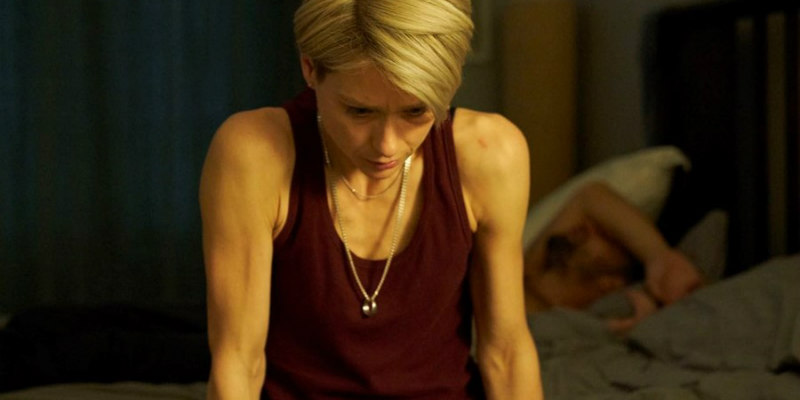
Review by Benjamin Poole
Directed by: Lucy Brydon
Starring: Siân Brooke, Amanda Burton, Fabienne Piolini-Castle, Nick Blood

Here’s one for the horror-a-film-a-day-during-October bunch (chancers, the lot of them. Horror all year long in this house): a film that is unsettling, upsetting and replete with the kind of creeping nihilism which comes hand in hand with addiction, the abstract threat that stalks writer/director Lucy Brydon’s quietly powerful Body of Water.

Sian Brooke plays Stephanie, a woman in her late thirties whose eating disorder has seen her hospitalised and also led to further psychological debilitations. These grim circumstances have meant that Stephanie is estranged from her teen daughter Pearl (Fabienne Piolini-Castle), who now lives with Stephanie’s mother Susan (played by Partridge favourite Amanda Burton), who is herself supporting Stephanie while arranging her upcoming nuptials. Although Brooke’s auteury debut is not a horror film per se, it features the sort of raw humanity and susurrant, insistent despair that a Wishmaster sequel is simply never going aspire to.
A published poet, you can sense Brydon’s previous artistic discipline in the heart-breaking cadence of her filmmaking, within the carefully measured rhythms of her sequences. We see Stephanie leave the spacious residential hospital - a pleasant, cushiony abode - arriving at the cramped confines of her mother’s house, with the exact details of her illness not explicated to us yet. Instead, there is the abiding awkwardness and forced cheer recognisable to anyone who has experienced someone close to them suffering from long term illness. What is ever present though, even if we can’t see it, is Stephanie’s eating disorder: we see the women sitting around the table at tea time, an early reminder of how central food is not only to our survival but our culture and interactions. Also immediately evident is Pearl’s savagery towards her mother. She feels abandoned by Stephanie, who, in fairness to Pearl, has been sporadically absent from her daughter both emotionally and physically, preoccupied with her illness and all its attendant miseries.

Brydon’s camera observes and never judges, aware that addiction makes people selfish, and that desperate narcissism is in fact a symptom of the illness. Stephanie’s eating disorder is presented as a compulsion, as irrational as it is urgent. There are no easy canards here that eating disorders are caused by external factors, such as pressures put on women, etc. After all, how would you explain male eating disorders, and the elected alienation of the sufferer? The closest Body of Water comes to annotating Stephanie’s disorder is when we see her sharing pictures of her increasing emaciation on the old social media, where various enablers like and comment on how far she’s gone in pushing and controlling her body.
Brooke offers an impressively physical performance, and reportedly did that thing where actors dramatically lose weight for their role. With her enviable bone structure (and, I have to say it, amazing haircut), the loss is vividly evident: there is a shower sequence where we see Brooke’s skin explicitly stretched over emerging bones in a bleak memento mori that I felt conflicted watching (I dunno, it’s only a film. I hate the idea of anyone putting themselves through it like that for me to watch in comfort later).

Water flows throughout the film, as a motif which manifests in Pearl’s name and her competitive swimming (another disciplined, physical endeavour), and the lapping shores of the seaside town which the women live in. I think it was the editor himself Eric Hillis who pointed out the preponderance of out of season seaside towns used in British dramas as a visual shorthand for bleakness, and Body of Water makes the most of this setting as we see Stephanie relapse into bad drugs and ill-advised sex, her condition destabilising not only herself but the lives of her family too.
The film suggests that true freedom is found through love, which perhaps gives way to Body of Water’s potentially problematic ending. Ultimately how do you end a story so faithful to the intransigence of addiction, a narrative as immutable as rocks in a pocket, and which has no resolution for so many?

Body of Water is in UK cinemas and on Digital from October 16th.

